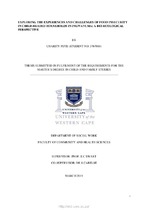Exploring the experiences and challenges of food insecurity in child-headed households in Ingwavuma: A bio-ecological perspective
Abstract
Child-headed households (CHHs) are a recent development that has become progressively
noticeable not only in South Africa but also internationally. This phenomenon arose as a
result of the death of parents or abandonment of children by their primary caregivers. The
Acquired Immuno Deficiency Syndrome (AIDS) epidemic has taken away the lives
particularly of many adults, leaving children orphaned and having to take on the adults’
responsibilities. In the past, relatives or the extended family would take the responsibility of
caring and providing for orphaned children but, with current economic hardships, most
families are unable to take the extra responsibility. As a result, older siblings become
caregivers to their younger siblings. Unfortunately, when parents die, children often lose
access to adequate food, social grants, education and health services. Despite the fact that it is
the right of all South Africans, including children, to have access to sufficient food, many
households, including CHHs, are living in poverty. As a result, they are vulnerable to food
insecurity, leading to developmental, social and emotional challenges.
The aim of the present study was to explore and describe the experiences, challenges and
coping strategies of CHHs with food insecurity in Ingwavuma, from a bio-ecological
perspective. Ingwavuma is a small rural town in KwaZulu-Natal Province, South Africa. The
study makes recommendations for social work projects, education and future research
regarding CHHs’ experiences of food insecurity.
This is a qualitative study that utilised an explorative-descriptive methodological approach.
Purposive sampling was used to select 20 children between the ages of 13 and 18 years old
from CHHs in Ingwavuma. One-on-one semi-structured interviews were conducted with the
participants at their homes in the town.

